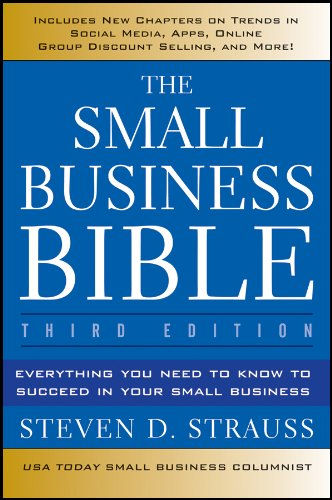
The Small Business Bible by Steven D. Strauss is, lets face it, not small! 559 pages of knowledge and it covers every business question you could possible have. It may not go as in depth on each subject, but it sure gives a lot of information and touches on so many areas. I enjoyed that the author also recommends other books throughout the chapters for further reading on particular topics.
What I found very interesting is that the first chapter has you take a quiz on if being an Entrepreneur is right for you. 21 questions about risks, leadership, security, confidence, etc. What a great way to start! Is entrepreneurship the right choice for your life? Chapter 2 goes right into choosing the right business. I would think most people would have a clear thought on this before they pick up this book, but I think it was smart to include this and go into depth on which businesses to get involved with. He also recommends heavily researching the business you want to choose. He then talks about the 3 C's: your company, your customers, and your competitors. Run an analysis of what your company is going to do, who will your customers be, and who your competitors are.
Next is writing a business plan. This is your roadmap for a successful journey of your business. Not only will this plan reduce risk, but it may also attract an investor. The book also go in depth of how to begin to write this. From the title page to the exit strategy. A business plan may change and have to be rewritten from time to time, and that's part of the process. This book came out in 2012 and was ahead of its time when we get to the chapter about home based businesses. Hello to taking another quiz! Home based businesses are now more common, but in 2020 we all had to find a way to navigate through the COVID pandemic. For some of us that included working from home. The book talks about a home based business being less expensive and practical. Most people enjoy working from home and being more flexible for their families. I think this is still true today and a lot of companies will choose to keep employees working from their homes. This completes section one of the book labeled starting your business.
Section 2 in this book is Running Your Business. Here the chapters are on money, management, and technology. I gained a lot of knowledge from the money section. Everything from accounting, profit, insurance, and taxes. This would be a good book to keep on your shelf and refer back to it as subjects arise in your business. Again, it just gives an overview of the topic, but Strauss does recommend books if you need to do in depth research. In the management section the topic of hiring and firing comes up. This book covers everything from employee vs independent contractor, hiring and firing, interviewing, and what benefits to offer your employee. The author states to not over look coachability which is vital to making a smart hire. "Coachability is an employee's ability to take direction and make changes, to listen and adjust, to think and respond." This is something I will remember as we hire in our company. I like the chapter that states happy employees work better, are engaged, and have a stake (financial or emotional) in the business. And on the subject of happy employees we learn about what is required for pay and benefits, insurance, and vacation time. I liked the interesting option Strauss suggests of making a list of paid holidays (this could be around 25) and you offer the employee to choose the ones that are important to them (this could be whatever number of paid holidays your company decides to pay for). This would make both parties happy! The management and technology section have so many good points, but this blog would get too long to list them all.
Section three is growing your business. I loved this section because it was all about your marketing plan, social media presence, website options, and sales. I would read and reread the sections again and again. The book gives tips for gaining leads and even what to post on social media pages. Since I am taking a bigger role on the sales side of our tile business and going to estimates, I learned about the 5 steps of a sales presentation: 1) create rapport 2) Introduce the service/product 3) Ask questions to find out what the customer needs 4) Highlight the benefits 5) Ask for the sale. I will be continuing to learn more about sales and keep these steps in mind. I would definitely recommend this book for anyone with a small business. I had so many pages tagged and learned so many things. I am honestly a little sad that I have to return this book to the library! Every page seemed to have something that pertained to our business. I am going to be buying this book and keeping it on my bookshelf for a reference. I also have an entire list of other business books to check out thanks to this author!
I will leave with the last sentence of the book which I love: "Be bold, for boldness has genius, magic, and power in it."

Comments